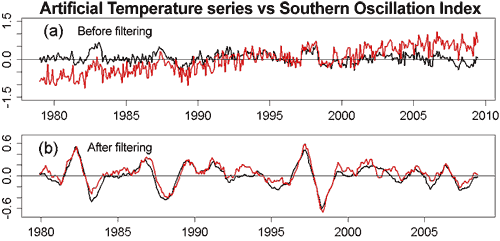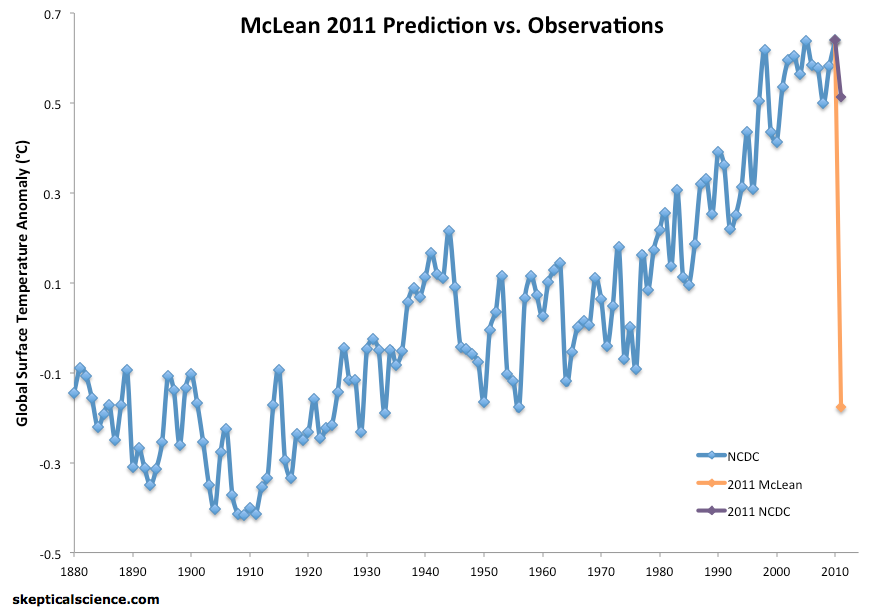DenialGate - Highlighting Bob Carter's Selective Science
Posted on 28 February 2012 by dana1981
Although we at Skeptical Science (SkS) do not condone the lamentable means through which Peter Gleick obtained the DenialGate documents from the Heartland Institute, the information is nevertheless out there. As we immediately noted, these documents should not distract us from the scientific evidence. While the behavior of Gleick and Heartland make for juicy tabloid fodder, they don't change scientific reality, and that reality is not influenced by political think tank politics, either. As Kate at ClimateSight put it,
"...on matters of science, there is a physical reality out there, so people can be wrong. Try arguing that your incorrect answer on a physics assignment deserves full marks, because it represents your personal opinion on the photoelectric effect. You probably won’t get very far."
In our first entry on the subject, we examined the key pseudo-scientific product of the Heartland Institute, the NIPCC report. In doing so we found that the Heartland climate "skeptics" are guilty of exactly what they wrongly accuse the IPCC and climate realists of doing: focusing only on a narrow subset of scientific literature which supports their climate position and ignoring the rest. In fact, the NIPCC report turns out to be little more than a regurgitation of a number of long-debunked climate myths, many of which are self-contradictory.
Here we will examine the scientific publications and arguments made by one of the NIPCC's lead authors on the Heartland Institute's payroll, Bob Carter, who unsurprisingly is guilty of many of the same inconsistencies and selective vision as the report he co-authored.
(Singular) Peer-Reviewed Climate Publication
One of the most troubling aspects about Bob Carter, who climate "skeptics" often reference as a climate expert and who is a lead author on the NIPCC report, is his dearth of climate publications. Carter has a long and distinguished career as a marine geologist, with many publications in that scientific field. However, he is relatively new to the field of climate science. Oddly, he has published more climate papers in economics journals (four) than he has in peer-reviewed climate science journals (one). Why Carter fancies himself an expert on climate economics is a mystery, although it's a trait he shares with a number of other "skeptic" climate scientists (such as Roy Spencer, John Christy, and Richard Lindzen).
However, we'll put Carter's economic papers aside for now and focus on his climate science publication, McLean et al. (2009). This paper was not particularly noteworthy, estimating the lag time before changes in the El Niño Souther Oscillation (ENSO) are reflected in the temperature of the lower atmosphere, and noting that ENSO accounts for much of the short-term temperature variability. Neither finding was particularly new.
However, McLean et al. managed to sneak in a conclusion that was not supported by their paper - that ENSO also accounts for much of the long-term global warming trend. Their study literally could not support this conclusion, as they removed the long-term global warming trend from the data during their analysis. Nevertheless, in media articles McLean argued that "If the SOI accounts for short-term variation then logically it also accounts for long-term variation," and Carter claimed the paper found that the "close relationship between ENSO and global temperature, as described in the paper, leaves little room for any warming driven by human carbon dioxide emissions."
As noted above, neither claim is even remotely true or at all substantiated by the analysis in the paper itself. McLean clarified that his 'logical' argument was based on eyeballing Figure 7 from their paper, which seems to show temperatures failing to rise above the ENSO Southern Oscillation Index (SOI) line. However, the figure in question splices together data from two distinct sources, first from weather balloons and then from satellites. The mean values of the weather balloon and satellite data during their period of overlap differ by nearly 0.2°C; splicing them together introduces an artificial 0.2°C temperature drop at the boundary between the two. In other words, McLean and Carter "hide the incline." In fact, Figures 1 and 4 from their own paper show the un-spliced data, and in both these figures temperatures increase while SOI is flat. McLean and Carter's argument was debunked by their own paper.
As noted above, Foster et al. (2010) also found that McLean and Carter had removed the long-term temperature trend from their data during their analysis. Foster et al. created an artificial temperature time series with a linear warming trend and then applied McLean and Carter's data filtering process.
The correlation between the raw artificial temperature series and the SOI series was very low (R2 = 0.0161). However, when the McLean et al. filters are applied to both time series, the correlation became very high (R2 = 0.8295). This is because the filtering removes low frequency elements such as the long-term warming trend.

Figure 1: (a) Southern Oscillation Index (SOI) data (black) versus artificial data proportional to the SOI, and with normally-distributed white noise and a sinusoidal signal added (red). (b): Filtered versions (using the McLean et al procedure) of the series in (a). From Foster et al (2010).
Despite the extreme distorting effect of their filter, McLean and Carter consistently refer to the correlations as between SOI and tropospheric temperature. They draw no attention to the fact that the correlations are between heavily filtered time series, and thus they incorrectly attribute global warming to ENSO.
The consequences of this faulty conclusion were made crystal clear when McLean attemped to use his and Carter's incorrect "logic" to predict global temperature changes in 2011. Since a strong La Niña was expected (and did in fact occur), McLean predicted a drastic drop in global temperatures, since he believed ENSO is the main temperature driver. Suffice it to say, McLean and Carter's beliefs radically diverged from reality (Figure 2).
Figure 2: NCDC global average surface temperature from 1880 through 2010 (blue), McLean's 2011 prediction (orange), and the actual 2011 NCDC temperature (purple).
Thus we find that Bob Carter's singular contribution to the peer-reviewed climate science literature, on which he was listed as the third of three authors, contained a completely unsubstantiated conclusion which Carter promoted in the mainstream media, but which was immediately proven wholly incorrect by the empirical observational data.
Carter's Faux Expertise
Despite Carter's clear lack of climate science expertise, he is often touted as a climate expert. He is one of just three lead authors on the Heartland Insitute's NIPCC report, which is supposed to be a "skeptic" rebuttal to the IPCC report, whose authors are amongst the most prominent climate scientists in the world.
Carter also frequently speaks about climate science in public, and publishes mainstream media articles on the subject. In the process, he has regurgitated an impressive number of climate myths. In our climate "skeptics" database, we have recorded 38 distinct climate myths repeated by Bob Carter in various speeches and articles.
As with the NIPCC report, many of these arguments are self-contradictory. For example, the temperature record, which supposedly shows that global warming stopped in 1998, is unreliable. Global warming is due to ENSO, and the sun, and it's not happening. And of course somehow the climate is sensitive to natural effects, but not CO2. For more detailed critiques of some of Carter's myths, see Carter Confusion #1: Anthropogenic Warming, Carter Confusion #2: Green Jobs, and Carter Confusion #3: Surface Temperature Record Cherries.
Like the NIPCC report he co-authored, Carter takes a very selective view of the climate science literature, and is himself no climate science expert. That the Heartland Institute pays Carter as one of its faux climate experts to author its pesudo-science reports is very revealing about the quality of Heartland's "science."































 Arguments
Arguments
























 0
0  0
0






Comments